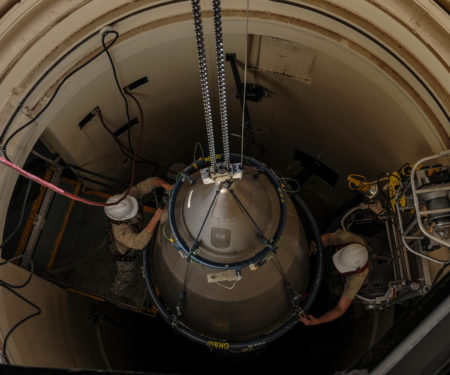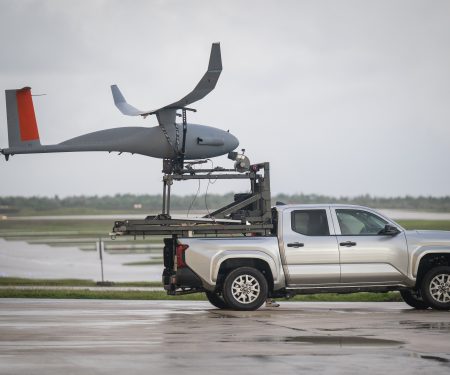Radar Sweep
American Drone Startup Notches Rare Victory in Ukraine
Above a battlefield littered with failed American drones, California startup Shield AI notched an important victory in Ukraine. The company in August became a rare Western supplier to demonstrate it can withstand the brutal electronic warfare that is downing drones across Ukraine. The country, which has preferred locally made drones, has now requested hundreds of Shield AI systems.
Iran Preparing Major Retaliatory Strike from Iraq Within Days, Israeli Intel Suggests
Israeli intelligence suggests Iran is preparing to attack Israel from Iraqi territory in the coming days, possibly before the U.S. presidential election, two Israeli sources tell Axios. Israel and Iran have been engaged in an escalating tit-for-tat for weeks. Carrying the attack out through pro-Iranian militias in Iraq and not directly from Iranian territory could be an attempt by Iran to avoid another Israeli attack against strategic targets in Iran.
North Korea’s Long-Range Missile Test Signals Its Improved, Potential Capability to Attack US
North Korea test-fired an intercontinental ballistic missile for the first time in almost a year Oct. 31, demonstrating a potential advancement in its ability to launch long-range nuclear attacks on the mainland U.S.
Rival Nations Try to ‘Divide, Degrade, Deceive’ US Voters, Experts Say
Russia, China, and Iran view next week’s presidential election as an opportunity to weaken American democracy by sowing doubt about the voting process and targeting one of the government’s key tenets—the peaceful transition of power, several cybersecurity and military experts said Oct. 31.
That F-35 That Flew on After the Pilot Ejected? 'Pilot Error' Blamed
The crash of an F-35 stealth fighter jet that went missing for more than 24 hours after the pilot ejected was caused by pilot error, a Marine Corps investigation found—but multiple system failures and bad weather contributed to the incident.
Updating Software at the Speed of Warfighting
As software has become essential to how the U.S. fights and wins wars, how the Department of Defense goes about modernizing and updating that software has become crucial too. Learn more about how faster software modernization is tying the military together, breaking through bureaucracy along the way.
SOCOM Adds New ‘Collaborative Autonomy’ Capabilities to Tech Wish List
U.S. Special Operations Command updated its technical areas of interest in a broad agency announcement to include additional autonomous capabilities that could aid commandos with their missions.
Full House: Google to Be Final JWCC Partner Authorized for Secret-Level Cloud Work in 2025
By the beginning of next year, all four of the Joint Warfighting Cloud Capability (JWCC) providers will have reached Impact Level 6 (IL-6) security authorization, which deals with information classified Secret, as Google becomes the last to join the pack, a military official said Oct. 29.
Army Investigating Gen. Kurilla, Head of Central Command, over Allegations He Shoved an Airman
One of the Pentagon’s top generals is under investigation for allegedly shoving an Airman on a flight in early September, a defense official and a spokesperson for the Army Criminal Investigation Division confirmed to Military.com.
Lasers, Microwaves, Missiles, Guns Not on the Table for Domestic Drone Defense
The U.S. military isn’t currently interested in fielding kinetic and directed energy capabilities, such as laser and high-power microwave weapons, surface-to-air interceptors, and gun systems, for defending domestic bases and other critical infrastructure from rapidly growing and evolving drone threats. Instead, the focus is on electronic warfare and cyber warfare, and other ‘soft-kill’ options, at least for the time being.
General Atomics, BAE Collaborate on Electronic Warfare Capabilities for CCAs
General Atomics Aeronautical Systems and BAE Systems are working together to build autonomous electronic warfare functions for Collaborative Combat Aircraft, GA-ASI announced Oct. 31. Through the partnership, BAE and GA-ASI remotely performed electronic attack capabilities in testing using an unmanned MQ-20 Avenger.
Space Force Opens National Security Launch Contracts to New Players
The U.S. Space Force on Oct. 30 opened the bidding process for emerging space launch providers to compete for national security missions under the National Security Space Launch (NSSL) Phase 3 Lane 1 program. The new request for proposals is part of an “on ramp” strategy designed to allow new entrants to vie for contracts alongside SpaceX, Blue Origin and United Launch Alliance (ULA).
The Truly Spooky Munitions Shortage for the Pentagon: Silver Bullets
With werewolves on the prowl and vampires stalking the shadows, there’s no more valuable munition on Halloween than silver bullets, legendarily capable of felling supernatural foes. The concept of a silver bullet may have its origins in folklore, but the term long ago evolved to signify a simple, quick solution to an intractable problem. ... This Halloween, Breaking Defense has collected a list of times defense leaders have openly wished that a silver bullet would appear, or lamented that one doesn’t seem available. This is a non-exhaustive list of all mostly from 2024, but still gives a sense of how the munitions shortage facing the US and its allies extends to the realm of the mystical.



